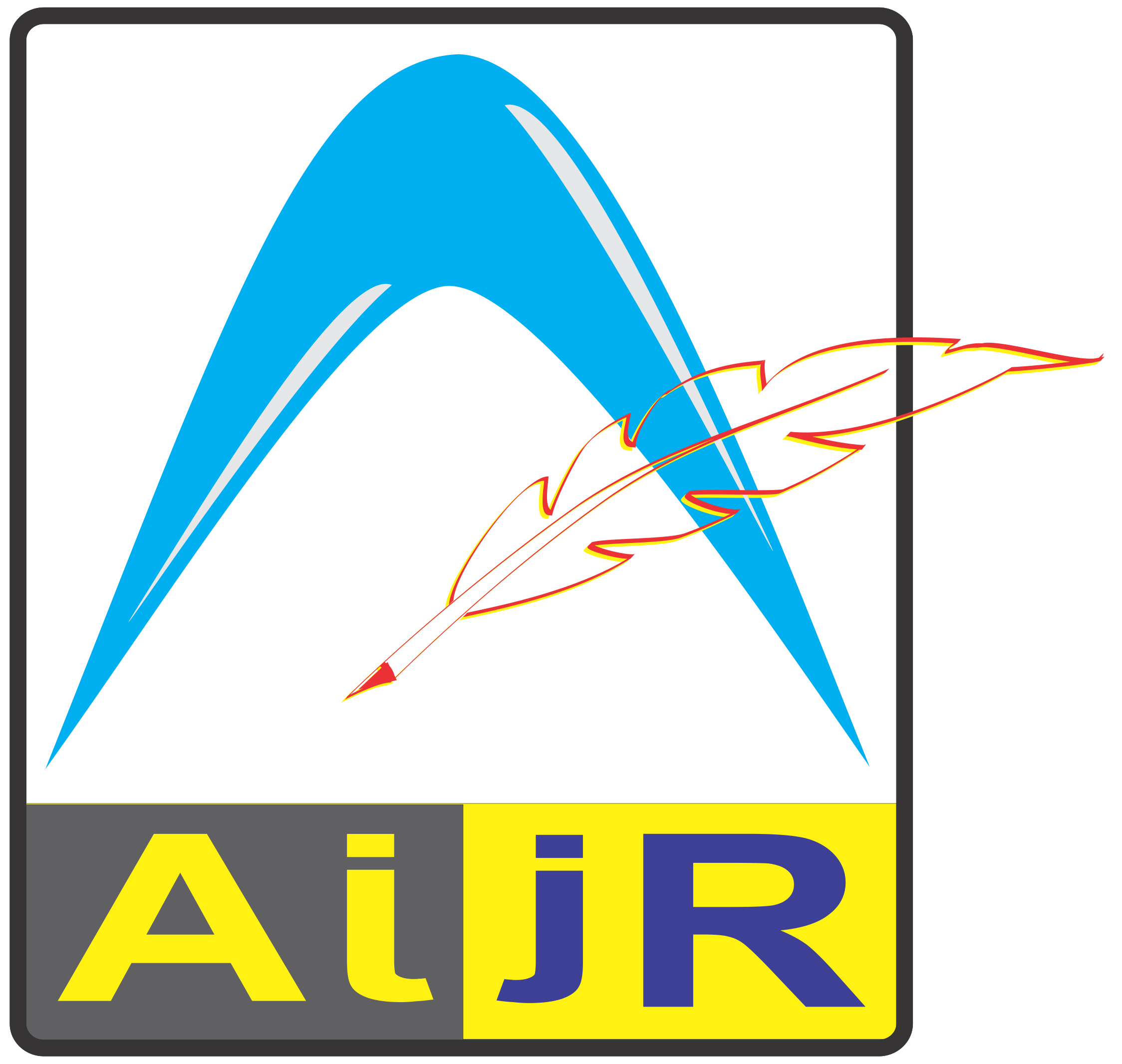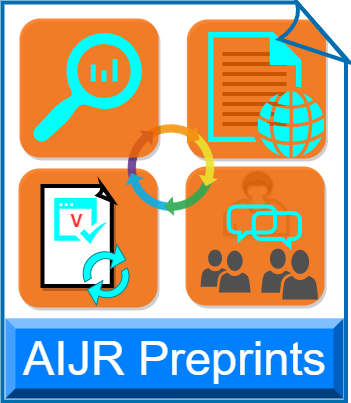Preprint
A preprint, in academic publishing, is considered as the author’s version of the research paper prior to the get published in any scholarly journal. Preprint papers go by many names such as; working paper, draft version, author’s version of a paper, etc. The preprint version of the research manuscript can be posted on the public server for faster and wider dissemination to the research community. The preprint is a significant footstep with incredible benefits for both, individual authors as well as the broader research community. In most cases, they are considered as final drafts or working papers. Once it is posted on a preprint server, the article will fully citable and becomes a permanent academic record. By sharing the research work early through a preprint server, researchers can accelerate the speed at which science moves forward.
About AIJR Preprints
AIJR Preprints is an open access, multidisciplinary preprint server from India, supported by AIJR publisher. Our mission is to publish the suitable preprints from all academic fields within 2 working days. AIJR Preprints consider early version of research work through following major sections-
- Working paper section for publishing those work which has not yet been submitted to any journal.
- Preprints section for the author’s version of article which already been submitted to a peer-reviewed journal.
- Coronavirus section for publishing all articles related to Corona virus and related disease.
- Under Review section is only for journals to submit abstracts of articles currently under review to their journal.
How AIJR Preprints Works?
Research Work
Conduct research work and write an article by following author guidelines & publication ethics. The work shall be plagiarism free with a similarity index of less than 20% & avoid data fabrication/falsification. The table should be represented properly and the figure/image shall be of high resolution without blurred or distortion.
Publish Preprint
Submit to preprint server for publication by following author guidelines. All contributors shall be included as co-author and aware of the submission. The paper will undergo screening based on the focused objective, writing style, & ethical compliance. You may need to respond and modify as per comments. Once found satisfactory, the preprint will get published.
Cite, Share & Discuss
Your published preprint is fully citable, shareable with an option to discuss on the server. The author shall share with their network for maximum comments & feedback. The author will be able to discuss valuable comments for further improvements. Anyone can read, comment, and cite as per open access CC license. This will increase exposure to the author’s ongoing work globally.
Update & Share
Continue the research and update with significant new findings or interpretations through the preprint’s versioning feature. The author may use the feedback obtained through public discussion. The author is free for submitting to any peer-reviewed journal and can link the preprint with DOI of the published peer-reviewed version.
AIJR Preprints in Brief
AIJR Preprints is a multidisciplinary server to accept research papers for all academic fields.
Author could be a research scholar, university student, faculty member, industry employee, organization representative, professional body, social worker, etc. having bachelor or above level qualification.
For research work of dynamic students below bachelor level, the paper can be submitted through the project guide or school principal. Visit this link for detail on submission of such work.
The authors are expected and responsible to follow the standard ethics in publication as follows-
- Authorship: The author shall ensure to include all eligible co-authors with their complete detail in the article.
- Originality: The article shall not be plagiarized. Content similarity shall be less than 20% by considering less than 5% from a single source.
- Honesty in Data: Author shall ensure that the manuscript does not contain any fabricated or falsified data.
A declarations section shall be added at the end of the article to include all applicable information as mentioned below-
- Study Limitations
- Acknowledgement
- Funding Source
Authors are expected to conduct research by adhering to high ethical standard. The research shall be conducted responsibly, maintaining the fundamental principles of research ethics.
Author shall include all applicable statements under the declarations section as mentioned below-
- Competing Interests: It is mandatory for everyone to include the conflict of interest statement.
- Ethical approval for human and animal subjects: If the research work is related to human or animal subject, author shall include ethical approval detail obtained from the competent authority (Ethical committee).
- Informed Consent: If research work involves human participant/respondent, author shall include informed consent statement taken from the participant/respondent.
- Hazard Warning: If the research work involves chemicals, procedures or equipment that have any unusual hazards inherent in their use, the author must clearly identify these in the manuscript and include a hazard warning statement under the declarations section.
AIJR preprints publishes article only after a formal screening based on adherence to the author guidelines, ethical standard, article’s basic structure, writing fluency and objectivity.
All preprints are posted using an open access Creative Commons CC BY 4.0 license. This allows readers to freely download, distribute, and reuse with proper attribution to the original author and preprints.
Published preprints are fully citable which helps authors to gain credibility while still waiting for peer-reviewing.
Readers can give feedback through embedded annotation tool available on article pdf view on the AIJR preprints server. Author can discuss and improve the article through same tool.
Author can update the preprint with new and improved version as soon as significant new work or interpretation available.
If the preprint get published to a journal, authors are responsible to link the preprint with doi of journal’s version.
All publications in AIJR preprints are indexed by the Google Scholar.
Authors can request for doi assignment to their preprint for higher visibility through CrossRef
AIJR Preprints is OAI-PMH compatible, interested library, repository are free to harvest article level metadata
AIJR Preprints organised articles through dedicated major sections and subject category for convenient browsing.
Preprint withdrawal may take place due to the following reasons:
- Misconduct by authors, including plagiarism and data fabrication.
- Serious scientific errors that cannot be corrected by updating the paper.
- Where leaving a paper online would constitute an illegal act, including copyright violation.
Once published, preprint becomes permanent part of the academic record and can not be fully removed. Preprint can only be updated to address any issue or withdraw as per defined withdrawal policy policy.
Preprint Screening Process
The preprint screening is carried out by AIJR Preprints screening body which consists of active researchers and the screening board members of AIJR Preprints.
The screening process is based on the following 3 consideration-
- Based on Author Guidelines: The author’s complete detail, the basic structure of the paper, formatting consistency, tables representation, figures quality, and proper reference citation.
- Ethical Compliance: Presence of conflict of interest statement and other applicable declarations as described under guidelines as well as compliance with publication ethics such as plagiarism and data fabrication.
- Basic Article Quality: The article should have a clear objective that must reflect in the contents including title, abstract, introduction, findings, discussion, and conclusion. The writing style should maintain fluency with appropriate recent reference citations to show the novelty of the work by comparing other’s similar work in the field.
Yes, If you are an active researcher and interested in contribution to preprints screening. As a screening member you will be eligible to avail 10% APC discount for every handled preprint when publishing your own article to any AIJR Journals. To join AIJR Preprints Screening Board, you shall fulfill following criteria-
- A Ph.D. or above level student, or A medical doctor, or A faculty member.
- Active in research with published article.
- Aware of Microsoft word usage for header/footer formatting.
- Able to complete preprint screening within 2 working days.
Initially, you will be considered as active researcher and related preprint will get assigned to you (maximum 2 preprints per month). After successful and timely screening of at least 10 preprints, you will be added to permanent screening board member.
If you fulfill the above criteria, apply through following joining form.
Preprint Screening Board Joining Form
Frequently Asked Questions (FAQ)
For Authors
Journal Article: It undergoes peer-reviewing which may takes months to publish and once published it can not be submit to any other journal.
Preprint: It publishes immediately without peer-reviewing. You can further submit to any journal which allows preprint posting for peer-reviewing and final publication as journal article.
Working paper section: You didn’t submit to any journal yet for peer-reviewing can be submitted to this section. You can still submit to a journal after publishing as working paper. Working paper may or may not be final draft of the research outcome.
Preprints Section: Author’s version of article which already been submitted to a journal for peer-reviewing can be submitted to this section. Usually preprints are final draft version of the research outcome.
For Readers
No, its not peer-reviewed. Articles on AIJR Preprints server are research work that has been submitted by the author. It is not yet scrutinize & certified through the peer reviewing process. Readers shall pay extra caution and should not consider or report in news media as established research work.
Yes, by following responsible sharing guide that focuses on clearly highlighting that the shared article/information is from a non-reviewed preprint.

